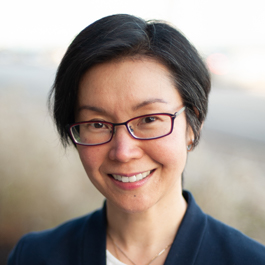May
24

Posted by randerson on May 24th, 2022
Posted in: NEC Profile
For Pearl Go, evaluation is often a balance between the importance of introspection and the joys of collaboration.
Having only recently begun a formal evaluation role at the Northwestern University Clinical and Translational Sciences (NUCATS) Institute, Go says she has used evaluation as a framework for continuous improvement throughout her life.
Early in her career, when Go worked with children as a developmental therapist and educator, she says, “evaluation was always a part of the work.
 “Now, I am working closely with the evaluation team at NUCATS, and evaluation has become a more formal part of my process.”
“Now, I am working closely with the evaluation team at NUCATS, and evaluation has become a more formal part of my process.”
Go has found enjoyment in both the inwardly reflective aspects of evaluation as well as the collaboration that takes place within the field.
“Evaluation enables people, programs, and organizations to look inward and reflect on what work they are doing and how they are doing it,” she says. “But it’s also deeply collaborative: there are people that guide you through that process, and that’s very exciting because you are helping others and together discovering a new part of the work.”
From a young age, Go has seen and experienced the power of teamwork. When she was a child in the Philippines, her mother, a doctor, would organize medical missions for communities that relied on free healthcare.
“It was almost always a celebration,” Go recalls. “The patients came to rely on these resources and there was always a sense of joy because we were able to help them.”
Her mother also instilled a deep sense of the importance for healthcare equity, community organizing, and the human experience, principles that permeate her work today.
“Science isn’t all numbers and charts,” she says. “There has to be humanity behind what you do.”
As the new Assistant Director of QA/QC and Continuous Improvement with the NUCATS Institute, Go finds herself in a highly collaborative position.
“You’re really helping people optimize their workflows,” she explains. “For example, there’s a process that maybe has been very cumbersome and we work to streamline it using tools available to us. If it were a mostly paper process, we can possibly use a digital system to make it much more efficient.”
But Go doesn’t just create systems, she also works with people to teach them how to use evaluation in their own projects.
“One part of my work is providing people with metrics they need so that they get a sense of how their programs are doing, are they meeting their target,” she says. “Another part of what I do is help people and programs build surveys and get data so that they might evaluate how they are doing.”
These surveys take many forms and build in feedback of everyone involved in the evaluation workflow.
The survey-building process itself is complex: not only do you have to plan how to get the inputs, but also how to use the outputs.
“When someone is building a survey,” Go says, “we also need to think about how we would like to use the data coming out of that survey. That then affects how we structure surveys later, seeing what makes more sense to create a data visualization.”
Evaluating her own skillset and ability to create tools is also a part of Go’s multifaceted process. Throughout it all, she centers her deep-rooted values for both the inward-looking and outwardly collaborative aspects.
“I really feel and strongly believe that for us to do better, we have to look inwards, we have to continually assess ourselves and our programs, and if you do that on a regular basis, it makes for a much better person and program and greater outward organization.”
Evaluating her current roles at Northwestern, Go can’t help but smile.
“I love the relationships I’ve formed with my collaborators and the support received from my team,” she says. “Northwestern is very collaborative, and I attribute a lot of the successes of the NNLM National Evaluation Center and NUCATS to the amazing people I work alongside.”